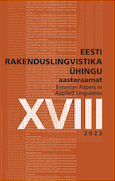COMPREHENSION OF COMPLEX LITHUANIAN SYNTACTIC CONSTRUCTIONS: A STUDY OF TYPICALLY DEVELOPING CHILDREN AND CHILDREN WITH DEVELOPMENTAL LANGUAGE DISORDER
COMPREHENSION OF COMPLEX LITHUANIAN SYNTACTIC CONSTRUCTIONS: A STUDY OF TYPICALLY DEVELOPING CHILDREN AND CHILDREN WITH DEVELOPMENTAL LANGUAGE DISORDER
Author(s): Laura Kamandulytė-MerfeldienėSubject(s): Morphology, Syntax, Language acquisition, Psycholinguistics, Baltic Languages, Developmental Psychology
Published by: Eesti Rakenduslingvistika Ühing (ERÜ)
Keywords: first language acquisition; syntax; morphosyntax; relative clauses; passive; wh-questions; Lithuanian;
Summary/Abstract: The aim of this paper is twofold. First, to compare the comprehension of complex Lithuanian syntactic constructions (relative clauses, passive sentences, wh-questions) in typically developing (TD) children and children with developmental language disorder (DLD). Second, to display the characteristics of comprehension of these constructions that can be attributed to specific language features of Lithuanian. This study demonstrates that both TD children and children with DLD have problems in comprehending passive sentences and wh-questions. TD children had fewer challenges in performing the relative clause comprehension task than the other tasks. However, children with DLD faced more difficulties in performing the relative clause task. The results show that children are more likely to make errors in interpreting object but not subject sentences. Even though in Lithuanian syntagmatic relations are marked by inflections, it is still difficult for children to grasp the syntactic relations between the subject and the object in complex constructions.
Journal: Eesti Rakenduslingvistika Ühingu aastaraamat
- Issue Year: 2022
- Issue No: 18
- Page Range: 131-148
- Page Count: 18
- Language: English

